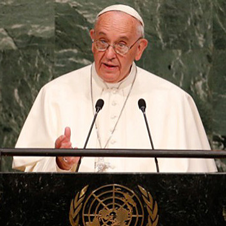 Post written by Rebecca Arbolino, J.D. expected 2017.
Post written by Rebecca Arbolino, J.D. expected 2017.
When Pope Francis addressed the seventieth session of the United Nations General Assembly, he focused upon the universal need for sustainable development and a healthy environment on a global scale. At the beginning of the substantive portion of his address, Pope Francis argued for “a true ‘right of the environment.’” Throughout the address, Francis stressed that the right to a habitable environment is a fundamental human right. He explained that “any harm done to the environment . . . is harm done to humanity.”
Pope Francis is not the first to argue that the full preservation of human rights requires the preservation of the environment. The Human Rights & Climate Change Working Group, one of many organizations working to advance international climate initiatives, similarly asserts that “climate change is a human rights issue.” According to The Office of the United Nations High Commissioner for Human Rights, “it is now well understood that climate change can and does adversely affect the enjoyment of a broad range of human rights.” In Resolution 18/22, entitled The Effects of Climate Change on the Full Enjoyment of Human Rights, the United Nations Human Rights Council clarified that
climate change poses an immediate and far-reaching threat to people and communities around the world and has adverse implications for the full enjoyment of human rights.
Leaders at the General Assembly touched upon various issues, but the need to counter climate change was a highlight of the seventieth session. Although tempers flared under the guise of political niceties, leaders otherwise prone to dissonance agreed upon the importance of sustainable development initiatives. During the general debate, for example, both Vladmir Putin and Barack Obama reached an uncharacteristic accord on the topic of sustainable development.
Despite their history of diametrical opposition, Putin and Obama agreed not only upon the importance of sustainable development but also upon an appropriate means for achieving sustainable development. According to Obama, we must “harness the potential of clean energy” to address “the ravages of an ever-warming climate.” Putin also stressed the need for
fundamental and new technologies…which would not damage the environment, but would be in harmony with it.
In accordance with Pope Francis’s call for sustainable development, the General Assembly unanimously adopted “a sweeping 15-year global plan of action to end poverty, reduce inequalities, and protect the environment.” Under Resolution A/70/L.1, among the listed components of the General Assembly’s vision is
“a world where human habitats are safe, resilient and sustainable and where there is universal access to affordable, reliable and sustainable energy” by 2030.
Pope Francis focused on the need to address climate change, but he reminded us that multilateral agreements are only half of the battle: “solemn commitments…are not enough, even though they are a necessary step toward solutions.” Despite the international community’s unanimity in pledging to combat climate change, the Resolution A/70/L.1 pledge is meaningless in the absence of subsequent, corresponding actions. As Secretary-General Ban Ki-Moon said before the adoption of Resolution A/70/L.1 and the Sustainable Development Goals, “the true test of commitment…will be implementation.”
Whether the Sustainable Development Goals are more than a unanimous but ultimately empty pledge remains unclear. When the Goals come into effect in 2016, we will see whether our world leaders will to answer Pope Francis’s call to take
concrete steps and immediate measures for preserving and improving the natural environment.
Great job writing this article. Climate change is a topic that should be discussed more on a global context. The effects it will have in future international conflicts are already on display in the Middle East.
The Right to a Habitable Environment as a fundamental human right is important for all of humanity. Pope Francis’s global plan to end poverty, reduce inequalities, and protect the environment is ambitious, but achievable. It seems that some of the world super powers are finally addressing the need to protect the environment. Hopefully these multilateral agreements are implemented.